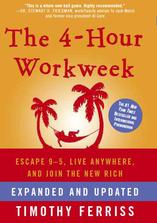 I recently finished reading The 4-Hour Workweek by Tim Ferriss. I can honestly say it was a game-and mind-changing book. The overall concept has to do with lifestyle design: structuring and optimizing every part of your life so that you can make concrete progress towards living your dreams here and now, rather than in the distant future. The author has made himself an expert in many fields, such as entrepreneurship, travel, Japanese, tango, health, martial arts, online marketing, and product design. As a person with many interests and hobbies myself, I have respect for a fellow Renaissance Man. My own philosophy has a lot in common with Tim's, which is why I found his book really striking a chord within me. However, it also made me realize how much of my own behavior and habits is self-destructive and pointless, even though I've been proud of those same habits for many years (e.g., "time management" and "promptness with email"). At times, those skills are helpful, but TIm does a great job explaining the danger behind them. This book had so many details and concrete suggestions that there is no way I can do them justice in a blog post that I want to keep relatively short. I will just try to highlight the most relevant or interesting suggestions. A lot of info can be found at 4hourblog.com. The overall book can be summarized by a simple acronym: DEAL.
The parts of the book that I question the most or do not fully agree with have to do with the cautions about technology and reading. I think it is clearly the case that there is too much information out there, and it is easy to get sucked into it. However, I think that if a person finds enjoyment or fulfillment from reading books or listening to audiobooks (also prohibited by the author, except for his audiobooks), then that's ok. In addition, I think it's fine to pursue businesses where you want to be actively involved and enjoy that. In general, the author's viewpoint is a little extreme (obviously to make a statement) but more or less correct. I definitely recommend this book to any other perfectionists, work-a-holics, and Renaissance Men and Women out there.
3 Comments
Sherman
2/6/2011 05:58:54 am
This is among the best book I read (in Chinese) back in 2009. It's good to read it again through your summary. Sometimes I lost a clear goal of life and, when I look back, it was such a waste of time and energy. It is important to make a good "DEAL" of life. Thanks for sharing!
Reply
Suman
4/24/2011 12:51:17 pm
Max,
Reply
primo
9/1/2012 04:53:50 pm
really good report , better than my notes !
Reply
Your comment will be posted after it is approved.
Leave a Reply. |
Archives
June 2024
Categories
All
Subscribe |
 RSS Feed
RSS Feed
